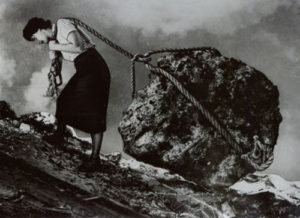Chesed (lovingkindness) is a key principal of Judaism. The word chesed is mentioned 245 times in the Torah. We read in Psalms that “the world is built on chesed” (89:3). The Haftarah for Parshas Balak, which ushers in The Three Weeks tells us “what is good, and what Hashem seeks from you: only the performance of justice, the love of chesed, and walking humbly with your God (Micha 6:8). But nobody said it would be easy.
My synagogue has a powerhouse Chesed Committee, one of whose tasks is arranging meals for those who gave birth, are mourning, or are sick. Modern technology has allegedly made this task easier with automated signup sheets and programs for scheduling meals. On Thursday night, I saw that a sick person’s family still needed a salad for Shabbat, so I typed my name in the empty field, and I wrote down the address.

My day begins early on Friday, as a whirlwind of cooking, cleaning and laundry must be completed. I make two salads, one for my family, and one for the family on the list. I beg my teenage son to deliver the salad, which those with teenage sons who are on their way to play sports know is a challenge in itself. I call the family to make sure someone is home to put the salad in the refrigerator. After my son leaves the house to make the delivery, the telephone rings. It is the wife of the family. “Did your son already leave with the salad? We don’t have any rolls.” On the one hand, I am trying to do a chesed. On the other hand, I did not sign up to bring rolls, I don’t have any rolls, and I don’t have time to go the store to buy rolls. So I tell her that I don’t have rolls.
When I take a break and check my email, I see that someone from the synagogue has posted that they have extra rolls from a recent simcha to give away. I sit for a few minutes and ponder, and I am reminded of cartoon with an angel on one shoulder and a devil on the other, or urging from the yetzer hatov and the yetzer hara:

Yetzer hara: I did my part and brought the salad.
Yetzer hatov: What hashgacha pratis that I see the notice about the rolls after the call.
Yetzer hara: It is so hot outside. Why do I want to pick up the rolls and drop them off?
Yezter hara: Other people must be seeing the notice and are dropping off other things for the family.
Yetzer hara: I still have more cooking to do.
Yetzer hatov: Most of the cooking and cleaning is done, and the thing on the stove can simmer for longer.
Yetzer hara: It’s kind of a chutzpah to call and ask for more stuff after I already made you something. You don’t know my time or economic constraints.
Yetzer hatov: This family needs the chesed, and I have been designated as the delivery person.
Okay, the yetzer hatov won out. I called the people with the rolls. They were still available. I called the family that needed the rolls. They could still use them. So I go out, walk down the hill to pick up the rolls, and then walk up the hill to deliver the rolls.

Deja Vu All Over Again
As I return to my house, I think to myself, “That address and accent are familiar.” Then it dawns on me. About a month ago I got a telephone call from someone who would not give me their name, but the mailman had delivered something with my English name to their mailbox. Okay. I am the only one in the phone book with my last name. I thanked the person and said they could put it in the mailbox. No, she was insistent; she was coming over to hand deliver it to me. Fine. My address is on the envelope. No, I had to describe exactly where I live — how many doors down from the people she knew. So I wait and wait, and she finally shows up to give me the letter. It was a birthday card from a friend. I looked at it and said, “Wow! My birthday is in April and it took two months to get here.” She replied, “No, it didn’t take that long. It was sitting in my pile of things to sort out since Pesach.” So she got the wrong mail, which could have been brought to the post office or just dropped in my mailbox, and she held onto it for two months.
When my son returns from sports, he tell me he saw the family in the park. Well isn’t that special! I wish I could go to the park with my family, but I am busy making salads for other people.
Just out of curiosity to see who else cooked for the family, I check the signup sheet. Someone else’s name is in the “salad” spot. Did she override my name? Did we both sign up at the same time? Did the family get two salads? Who knows?
I don’t know what the moral of this story is, but I’ve obviously been trying to find one.

